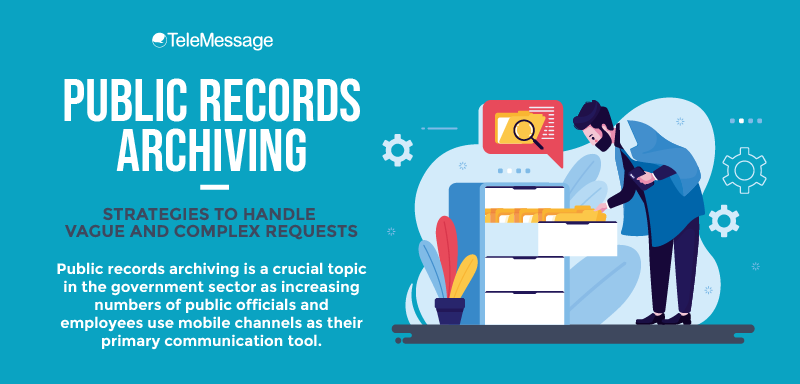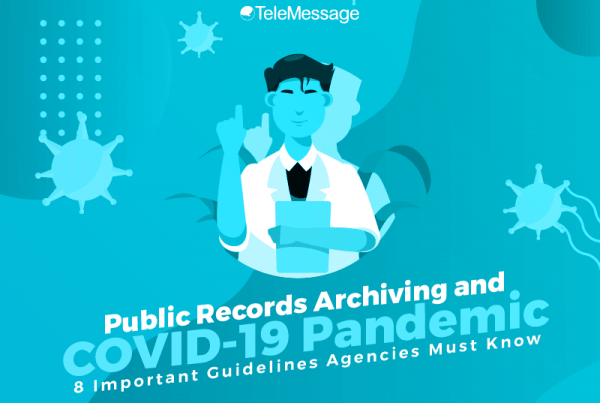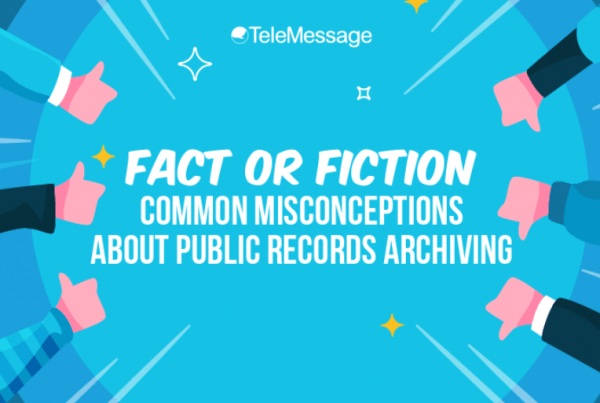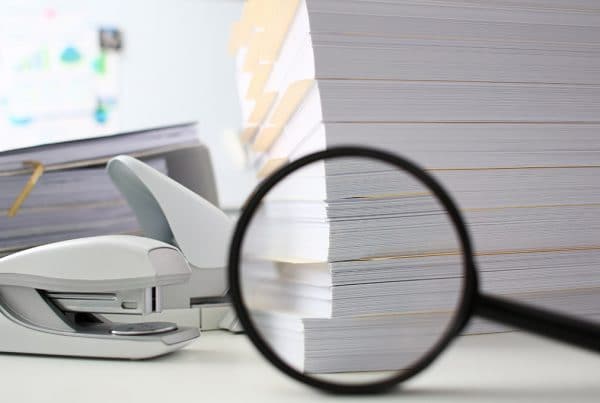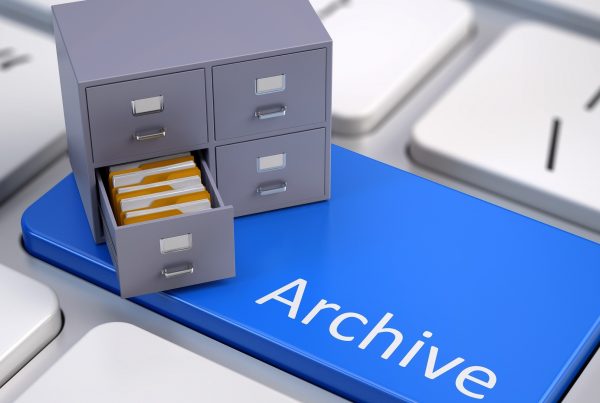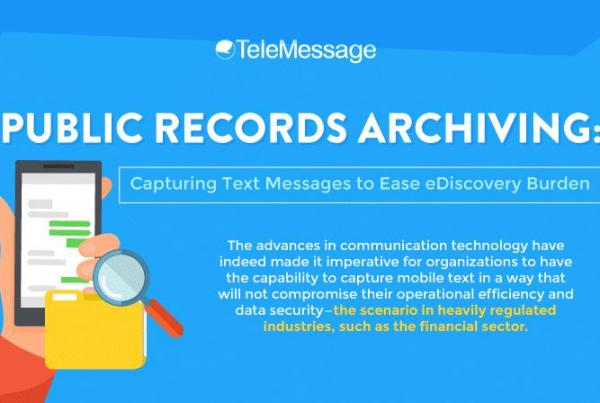Public records archiving is a crucial topic in the government sector as increasing numbers of public officials and employees use mobile channels as their primary communication tool. As government agencies move away from traditional communication platforms such as desktop email and into mobile SMS, WhatsApp, and other mobile messaging apps, the process of responding to public records requests has also become more challenging.
Several cases have been reported wherein agencies and offices were not able to comply with public records requests, particularly for texts and emails of public officials. In 2017, the Missouri Alliance for Freedom filed a complaint with the Missouri attorney general’s office alleging state Auditor Nicole Galloway is non-compliant with FOIA text message archiving requirements by refusing to turn over requested documents, including text messages sent and received on her state-issued phone.
Another recent case of non-compliance with public records archiving involved White House Senior Advisor Jared Kushner. He allegedly used WhatsApp to discuss official matters with foreign contacts, potentially violating WhatsApp public record archiving laws.
That said, while having a public records archiving solution can make searching for requested mobile communication records easy, it still can be quite daunting to face limitless requests – especially if they are narrow, complex, or simply vague.
To help out, we detailed in this infographic the strategies that government agencies and offices can follow to streamline their FOIA response process when faced with vague and complex requests for records of public communications.

- Vague Requests
When the requests are worded so vaguely, and there’s no way to interpret them accurately, a clear request for clarification should be sent.
When requesting for clarification, the agency can either provide their own interpretation and allow the requestor to confirm if it’s correct, or ask the requestor with more information about the parts of the request which are unclear. When the requestor doesn’t respond nor correct the interpretation, the agency can assume that they have interpreted the request correctly.
By sending a request for clarification, the agency will be able to fulfill its obligation to notify the requestor, as well as show that it is acting in good faith and acting in its best capability to fulfill the request. In case the requestor files a lawsuit against the agency for its failure to produce the correct records, the documentation of the request for clarification can be used as a proof that the agency has provided the requestor the chance to correct the interpretation of the agency got it wrong.
It should also be noted that the agency should begin searching for clear and specific items in the request – it will help the agency to comply within the response period, all while waiting for clarification regarding the ambiguous portions of the request.
- Complex Requests
Agencies face complex and overwhelming public records requests, with some having no choice but to reject a request because it is simply unreasonable.
In 2015, the office of Attorney General Bob Ferguson denied the request of a certain Tim Clemans of Seattle for 600 million emails of state employees sent and received through the years. While not realistic, this kind of overbroad public records request is an issue that agencies should address, especially if the records requested are “identifiable.”
When requested for a large volume of records, such as three years’ worth of employee text messages, knowing where those records are stored should be the priority. Doing so will help the agency avoid being entangled in the mire of complex requests.
Once the location of the requested mobile communications is identified, notifying the requestor that the records will be provided on an installment basis should be taken as the next step, providing the agency with several advantages:
- They are not obligated to start with the second batch until the requestor pays for the first installment;
- The requestor might look for a specific record in the first installment, which would then motivate them to narrow their search.
- Allow the agency to deliver the records that are easiest to find and produce, and move to more complicated portions of the request in the next batch of installment.
Ensuring an Efficient Search Through Mobile Public Records Archiving Solution
For a government agency or office to prove that they have conducted a reasonable search during public records lawsuit, they must show evidence of how they conducted the search, where they searched for the records, and that they searched on locations where the requested records were likely to be found.
To satisfy these expectations, government agencies and offices must ask the following questions before searching for captured mobile communications:
- What type of mobile communications is being requested (mobile SMS, voice call, WhatsApp chat, etc.?
- Which department or official does the requested record relate to?
- What time frame applies to the requested records?
- Where is the requested record potentially stored?
- In what format does the requestor want the records (electronically, printed on paper, etc.)
With these questions answered, parameters for the search can be set. It’s also a good idea to keep track of the time spent searching – this ensures that the FOIA officer can charge the requestor for processing the request unless a fee waiver has been granted.
Lastly, having a holistic mobile archiving solution can significantly make the search process streamlined and faster. Aside from real-time recording of mobile communications, a public records archiving compliant solution should also be equipped with a search function that would allow for quick access and retrieval of requested electronic records. It should also store all the captured communications and their metadata in a central database so that the agency can provide the requestor with all the records relevant to their request in a timely fashion as possible.
With TeleMessage, public agencies and institutions can effectively comply with public records archiving laws, including the FOIA text message archiving requirements. The TeleMessage Mobile Archiver is an enterprise messaging app that effectively addresses compliance, regulatory, eDiscovery response requirements and reduces risk across the public sector.
TeleMessage’s Mobile Archiver solutions can record SMS messages, record voice calls, and other mobile content such as MMS and WhatsApp chats and calls from corporate or BYOD mobile phones. Messages are securely and reliably retained within TeleMessage servers or forwarded to an archiving data storage vendor of your choice.
Our mobile archiving products securely capture content from mobile carriers and mobile devices for a variety of ownership models (BYOD, CYOD, and employer-issued). With our multiple archiving solutions, you can always find the right tools or blend for your requirements:
TeleMessage offers cross-carrier and international mobile text & calls archiving for corporate and BYOD phones. Visit our website today at www.telemessage.com to learn more about our mobile archiving products
